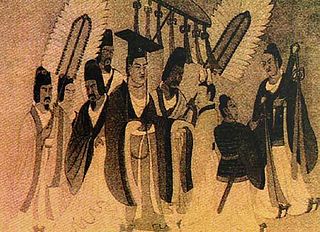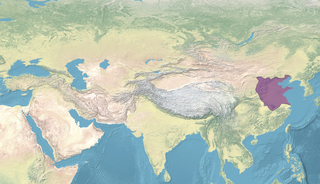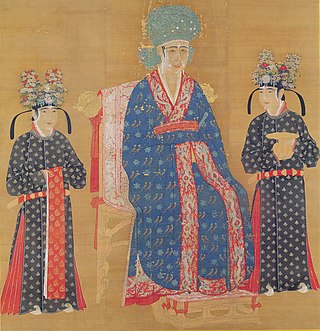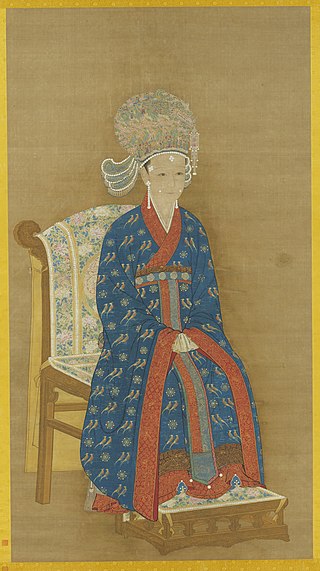Related Research Articles

Song, known as Liu Song, Former Song (前宋) or Song of (the) Southern dynasties (南朝宋) in historiography, was an imperial dynasty of China and the first of the four Southern dynasties during the Northern and Southern dynasties period. It succeeded the Eastern Jin dynasty and preceded the Southern Qi dynasty.

The Northern and Southern dynasties was a period of political division in the history of China that lasted from 420 to 589, following the tumultuous era of the Sixteen Kingdoms and the Eastern Jin dynasty. It is sometimes considered as the latter part of a longer period known as the Six Dynasties (220–589). Albeit an age of civil war and political chaos, it was also a time of flourishing arts and culture, advancement in technology, and the spread of Mahayana Buddhism and Daoism. The period saw large-scale migration of the Han people to the lands south of the Yangtze. The period came to an end with the unification of all of China proper by Emperor Wen of the Sui dynasty.

Wei, known in historiography as the Northern Wei, Tuoba Wei, Yuan Wei and Later Wei, was an imperial dynasty of China ruled by the Turkic Tuoba (Tabgach) clan of the Xianbei. The first of the Northern dynasties, it ruled northern China from 386 to 535 during the period of the Northern and Southern dynasties. Described as "part of an era of political turbulence and intense social and cultural change", the Northern Wei dynasty is particularly noted for unifying northern China in 439, bringing an end to the chaotic Sixteen Kingdoms period, and strengthening imperial control over the rural landscape via reforms in 485. This was also a period of introduced foreign ideas, such as Buddhism, which became firmly established. The Northern Wei was referred to as "Plaited Barbarians" by writers of the Southern dynasties, who considered themselves the true upholders of Chinese culture.

Emperor Xiaowen of Northern Wei ( 魏孝文帝), personal name né Tuoba Hong (拓拔宏), later Yuan Hong (元宏), was an emperor of China's Northern Wei dynasty, reigning from September 20, 471 to April 26, 499.

Qi, known in historiography as the Southern Qi or Xiao Qi, was a Chinese imperial dynasty and the second of the four Southern dynasties during the Northern and Southern dynasties era. It followed the Liu Song dynasty and was succeeded by the Liang dynasty. The main polity to its north were the Northern Wei.

The Chen dynasty, alternatively known as the Southern Chen in historiography, was a Chinese imperial dynasty and the fourth and last of the Southern dynasties during the Northern and Southern dynasties period. Following the Liang dynasty, the Chen dynasty was founded by Chen Baxian. The Chen dynasty further strengthened and revitalized the economy and culture of southern China, and made territorial expansions northward, laying the foundation for future dynasties. It was conquered by the Sui dynasty in 589, marking an end to the Northern and Southern dynasties period in Chinese history. The descendants of the Chen imperial family continued to hold powerful high-ranking positions in the imperial courts of both the Sui and Tang dynasties.
Heqin, also known as marriage alliance, refers to the historical practice of Chinese monarchs marrying princesses—usually members of minor branches of the ruling family—to rulers of neighboring states. It was often adopted as an appeasement strategy with an enemy state that was too powerful to defeat on the battlefield. The policy was not always effective. It implied an equal diplomatic status between the two monarchs. As a result, it was controversial and had many critics.

Qi, known as the Northern Qi, Later Qi (後齊) or Gao Qi (高齊) in historiography, was a Chinese imperial dynasty and one of the Northern dynasties during the Northern and Southern dynasties era. It ruled the eastern part of northern China from 550 to 577. The dynasty was founded by Gao Yang, and was eventually conquered by the Xianbei-led Northern Zhou dynasty in 577.
Zhang Yan, known formally as Empress Xiaohui (孝惠皇后) was an empress during the Han Dynasty. She was a daughter of Princess Yuan of Lu and her husband Zhang Ao, the Prince of Zhao and later Marquess of Xuanping.
Empress Bo was an empress during the Han dynasty. She was the first wife of Emperor Jing, and also the first empress to be deposed in Chinese imperial history.

Yin Lihua, formally Empress Guanglie (光烈皇后), was an empress during the Eastern Han Dynasty. She was the second empress of her husband Emperor Guangwu, even though she was his first wife and married him before his first empress, Guo Shengtong, did. She was famed for her beauty and meekness.

Xiao Yanyan, also known as Empress Dowager Chengtian (承天皇太后) was a Khitan empress and military leader of imperial China's Liao dynasty. She was regent on behalf of her son from 982.

Princess Pingyang (平陽公主) was a Western Han dynasty princess. She was the eldest daughter of Emperor Jing of Han and his second empress Empress Wang Zhi, the most famous sister of Emperor Wu, and the former master and later wife of renowned military general Wei Qing.
Women in ancient and imperial China were restricted from participating in various realms of social life, through social stipulations that they remain indoors, whilst outside business should be conducted by men. The strict division of the sexes, apparent in the policy that "men plow, women weave", partitioned male and female histories as early as the Zhou dynasty, with the Rites of Zhou, even stipulating that women be educated specifically in "women's rites". Though limited by policies that prevented them from owning property, taking examinations, or holding office, their restriction to a distinctive women's world prompted the development of female-specific occupations, exclusive literary circles, whilst also investing certain women with certain types of political influence inaccessible to men.

Empress Cao was a Chinese empress consort of the Song dynasty, married to Emperor Renzong of Song. She served as regent of China during the illness of Emperor Yingzong, from 1063 until 1064.

Empress Meng was a daughter of Meng Yuen and the Chinese empress consort of the Song dynasty, married to Emperor Zhezong of Song. She served as a regent of China in 1127, and during the minority of Emperor Zhang, the son of Emperor Gaozong of Song, who was temporarily placed upon the throne for 25 days in 1129. She played a significant political role in Chinese politics: first by legitimizing the Da Chu dynasty in 1127, and then ending it by legitimizing Emperor Gaozong of Song as the heir of the Song dynasty.

Empress Wu was a Chinese empress consort of the Song dynasty, married to Emperor Gaozong of Song. She played an influential part in politics of the Southern Song dynasty for 35 years having caused the abdication of three subsequent monarchs: Emperor Gaozong in 1162, Emperor Xiaozong in 1189, and Emperor Guangzong in 1194.

Liu Wu (刘武), posthumously named Prince Xiao of Liang, was a Han prince. He was a son of Emperor Wen and Empress Xiaowen, and a younger brother of Emperor Jing. He played a prominent role in the suppression of the Rebellion of the Seven Princes. He was also responsible for the assassination of the minister Yuan Ang.

The military history of the Northern and Southern dynasties encompasses the period of Chinese military activity from 420 to 589. Officially starting with Liu Yu's usurpation of the Jin throne and creation of his Liu Song dynasty in 420, it ended in 589 with the Sui dynasty's conquest of Chen dynasty and reunification of China proper. The first of the Northern dynasties did not however begin in 420, but in 386 with the creation of Northern Wei. Thus there is some unofficial overlap with the era of the Sixteen Kingdoms.
Liu Xijun, also known as Princess Xijun (細君公主), Princess of Jiangdu or the Princess of Wusun, was a princess of the Han dynasty sent to marry the King of Wusun as marriage alliance. A poem said to be by her is one of the earliest known Chinese poems attributable to a named woman.
References
- Lee, Lily Xiao Hong (2007). "Han Lanying". In Lee, Lily Xiao Hong & Stefanowski, A. D. (eds.). Biographical Dictionary of Chinese Women. Vol. Antiquity through Sui: 1600 B.C.E. - 618 C.E. Armonk, NY: M. E. Sharpe. ISBN 978-0-7656-1750-7.